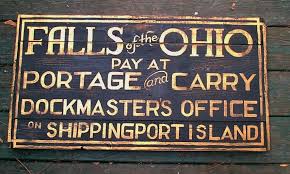Annotation:Shippensport: Difference between revisions
No edit summary |
No edit summary |
||
| (One intermediate revision by the same user not shown) | |||
| Line 2: | Line 2: | ||
{{TuneAnnotation | {{TuneAnnotation | ||
|f_tune_annotation_title=https://tunearch.org/wiki/Annotation:Shippensport > | |f_tune_annotation_title=https://tunearch.org/wiki/Annotation:Shippensport > | ||
|f_annotation='''SHIPPENSPORT.''' AKA – “Shippinport,” “Shipping Port,” “Shippingport” AKA and see “[[Blackbird Says]] (to the Crow).” American, Reel (cut or 2/4 time). USA, eastern Kentucky. G Major. Standard tuning (fiddle). AABB (Titon): AABBCC (Phillips). Shippensport or [[Wikipedia:Shippingport,_Kentucky]] was a small town in the northeast part of the state (now absorbed by the city of Louisville), located at the foot of the Louisville and Portland Canal. Falls were once present on the Ohio River at that location, requiring in former times the removal of goods from river craft that then had to portage the falls. A town grew up around the falls, Shippingport, catering to the river boat traffic between the upper and lower Ohio River, including a number of taverns, one of which was run by the Kentucky giant, [[wikipedia:Jim_Porter_(giant)]] (1811-1859). Eventually a dam was built with locks for river traffic, and that, along with the construction of the canal, obviated the strenuous and time-consuming chore of portage, although it destroyed the livelihood of the community. All that remains of Shippingport today is in the name of nearby Shippingport Island. | |f_annotation=[[File:Shippingport3.jpg|right|500px|thumb|]]'''SHIPPENSPORT.''' AKA – “Shippinport,” “Shipping Port,” “Shippingport” AKA and see “[[Blackbird Says]] (to the Crow).” American, Reel (cut or 2/4 time). USA, eastern Kentucky. G Major. Standard tuning (fiddle). AABB (Titon): AABBCC (Phillips). Shippensport or [[Wikipedia:Shippingport,_Kentucky]] was a small town in the northeast part of the state (now absorbed by the city of Louisville), located at the foot of the Louisville and Portland Canal. Falls were once present on the Ohio River at that location, requiring in former times the removal of goods from river craft that then had to portage the falls. A town grew up around the falls, Shippingport, catering to the river boat traffic between the upper and lower Ohio River, including a number of taverns, one of which was run by the Kentucky giant, [[wikipedia:Jim_Porter_(giant)]] (1811-1859). Eventually a dam was built with locks for river traffic, and that, along with the construction of the canal, obviated the strenuous and time-consuming chore of portage, although it destroyed the livelihood of the community. All that remains of Shippingport today is in the name of nearby Shippingport Island. | ||
<BR> | <BR> | ||
<br> | <br> | ||
Latest revision as of 04:40, 25 January 2021
X:1 T:Shippin' Sport S:Doc Roberts (1897-1978, Richmond, Madison County, Ky.) M:C| L:1/8 R:Reel Q:"Quick" D:Gennett 6689 (78 RPM), Fiddlin' Doc Roberts (1929) F:https://www.slippery-hill.com/recording/shippensport-0 Z:Transcribed by Andrew Kuntz K:G ef|"*$"g2 ef e2d2|BAGB AG[G2B2]|gfga gedg|ea2^g a2f2| gfga gedg|dBAG BGEF|GFGE DEGA|BGAF G2:| |:AB|c2c2 BAGB|AGBG AGEF|GFGE DEGA|BGBG A2G2| "**"c2c2 BAGB|AGBG AGEF|GFGE DEGA|BGAF G2:| P:Substitutions "*"g2 (f/g/f) e2d2||"or $"gfga gedg|edBG A2[G2B2]|]"**"c2 ec Bcdc|BAGB AGEF|]

The tune is sometimes played as a two-part tune (see Doc Roberts and John Master’s versions).
See the Irish reel "Greenfields of America (1)" which is related in the low part, as is Uncle Pen Vandiver's "Poor White Folks" and Samual Bayard's "Old Mother Flanagan (Bayard, No. 265). The melody was known to African-American fiddler Cuje Bertram as “Blackbird Says to the Crow.”

